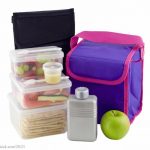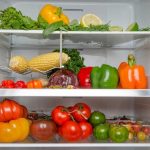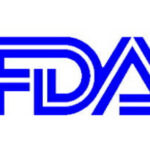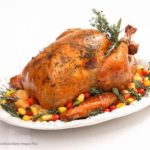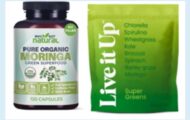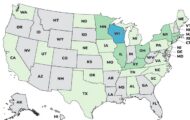Believe it or not it's that time of year again; these back to school lunch safety tips from the USDA will keep your kids healthy all year long. If your child brings a lunch rather than buying lunch at school, these are things you need to know. Children, especially young children, are more likely to have serious consequences from food poisoning, so it's especially important to follow these food safety tips. Dr. Justin Ransom, USDA Food Safety and Inspection Service (FSIS) Administrator said in a statement, "As the school year begins, we want families to keep food safety top of mind, Young children are more vulnerable to foodborne illness, and we want to make sure they stay healthy and ready to learn." First keep cold foods cold. You should use at least two cold sources, such as … [Read more...]
Fourth of July Food Safety Tips From the USDA
Get these Fourth of July food safety tips from the USDA for a happy and safe holiday. This is high season for summer grilling, and there are some things you need to know to keep family and guests healthy. Food safety starts with handling food. If you purchased frozen food, especially meats, for your party, make sure that you thaw beef, poultry, or fish in the refrigerator, in cold water, or in a microwave. Never thaw food on the counter. And remember that when thawing with cold water or the microwave oven, the food must be cooked immediately. Check the package to see if the food is pre-browned or browned but not fully cooked. Some of these foods can seem cooked, but they must be treated as raw food and cooked to a safe final internal temperature. Any product labeled “Cook and … [Read more...]
FDA Warns About Products From East Africa Boutique
The FDA is warning consumers, retailers, and distributors about products from Pan-African Food Distributors doing business as East Africa Boutique because they were held under insanitary conditions and could be contaminated with filth. These items include infant nutritional cereals, baking ingredients, and other food products. The products may or may not have a label with the firm name. The warning was updated on June 3, 2025 to include cosmetics. Products that are held under insanitary conditions could pose a serious health risk and could lead to serious illness, including leptospirosis, hantavirus infection, salmonellosis, yersiniosis, E. coli infections, and rat-bite fever. You can see the long list of products, along with package sizes, lot codes, and expiration dates at the … [Read more...]
Serving Ham For Easter? Learn Food Safety Tips From USDA
Are you serving ham For Easter dinner? Learn these food safety tips from the USDA and have a happy and safe holiday. Did you know that hams can be ready to eat, fresh hams that must be cooked before eating, picnic hams, and country hams? Learn their storage times, cooking methods, and safety tips. It's important that you know exactly what kind of ham you have before you learn how to cook it. Ask your butcher or supplier to identify the ham exactly. They will often have cooking directions and times you can use. You can see the chart with all of the kinds of hams at the USDA web site. The general rule is that all raw fresh ham and ready to eat hams should be cooked at 325°F until it reaches the minimum internal temperature of 145°F. Then let the meat rest for a minimum of three … [Read more...]
Protect Yourself in the Wake of Cuts to FDA, USDA, and CDC
Learn how to protect yourself in the wake of cuts to FDA, USDA, and CDC. Today we learned that many scientists and food safety experts have lost their jobs at those agencies. What does that mean to you and your family and how can you protect yourself? You have always been the final piece of the puzzle for food safety. Contaminated food has always been sold; in fact, the government has allowed chicken to be sold when it is contaminated with a certain level of Salmonella, and recalls often come after people have been sickened by contaminated food. So if you are already following food safety precautions you are ahead of the game. First of all, always follow the rule of Clean, Separate, Cook, and Chill. Wash your hands before you start cooking. Start with a clean kitchen and … [Read more...]
Super Bowl Food Safety Tips From the USDA
Get Super Bowl food safety tips from the USDA to make your party the best ever. When you are entertaining, food safety is more important than ever. And you have to consider the health issues and ages of all of the people you invited. If you are getting takeout or having food delivered, make sure that it is quickly refrigerated or placed in the oven until your guests arrive. Pizza, chicken wings, sliders, chili and other favorites can't stay at room temperature for more than two hours, no matter how hot they were to begin with, or bacteria will grow. The danger zone is between 40°F to 140°F. In that zone, bacterial counts can double every 20 minutes. And the same rule applies to chilled foods. Get them back into the fridge after two hours; that time shrinks to one hour if the … [Read more...]
FDA Releases Allergen, Food Safety, and Plant Based Labels
FDA releases allergen, food safety, and plant based labeling guidelines to help industry understand and comply with regulations. The food safety guidelines cover low moisture ready to eat foods. Food Allergens This guidance covers food allergens, including questions and answers about food allergen labeling requirements, the labeling of tree nuts, sesame, milk, eggs, incidental additives, highly refined oils, dietary supplement products, and certain specific packing and labeling situations, such as individual units within a multiunit package. The FD&C Act requires that any food that is made from two or more ingredients must declare each ingredient by its common or usual name. But consumers may not be familiar with those names, and may not recognize that the ingredients contain … [Read more...]
Thanksgiving Turkey Safety Tips From the USDA
Get Thanksgiving turkey safety tips from the USDA, including how to thaw and cook the bird, for a safe holiday. The biggest meal of the year comes with special food safety issues, especially regarding the turkey. The first step is thawing the turkey, if you purchased a frozen bird. Never ever thaw turkey or any meats at room temperature. Turkey can be thawed in the fridge; allow 24 hours for every four pounds of turkey. That means if you bought a 16 pound turkey, you need to allow four full days for thawing. After the turkey is thawed using this method, it can be kept, uncooked, in the fridge for two days. You can also thaw the turkey in cold water. Allow 30 minutes of thawing per pound, and submerge the turkey in its original wrapping. Change the water eery 30 minutes until the … [Read more...]
Halloween Food Safety Tips From the FDA
It's almost Halloween! Get these Halloween food safety tips from the FDA to keep your kids safe. Once the costumes are ready there are some things for you to think about. First of all, make sure your kids eat a healthy snack or meal before they head out trick or treating. Tell them they should not eat any of the candy or treats they receive until they get home and you can look them over. Children should be told not to accept or eat any homemade treats. Only accept commercially wrapped, inspected treats. And when they get home, look over the candy carefully for any signs of tampering, including unusual appearance, discoloration, pinholes, tears, or rips in the wrappers. Throw away anything that looks suspicious. If your child has a food allergy, check the label to make sure the … [Read more...]
Flood Waters Contain Chemicals, Pollutants, Bacteria, and Viruses
With Hurricane Milton poised to hit Florida tomorrow, and people still cleaning up from Helene, there are some things you need to know about flood water. Drowning and building damage are not the only risks from floods. And this water is not just dirty. Flood waters contain chemicals, pollutants, bacteria, toxins, and viruses that can make you sick. And eating food or drinking water contaminated with these waters can be very dangerous. Even containers that you think are sealed are not impervious to flood water. Charlotte County issued a bulletin about these dangers. First, if you are under a boil water notice, use commercially boiled water for mixing baby food formula. Wash your hands with soap and either disinfected or boiled and cooled water, especially before preparing or … [Read more...]
